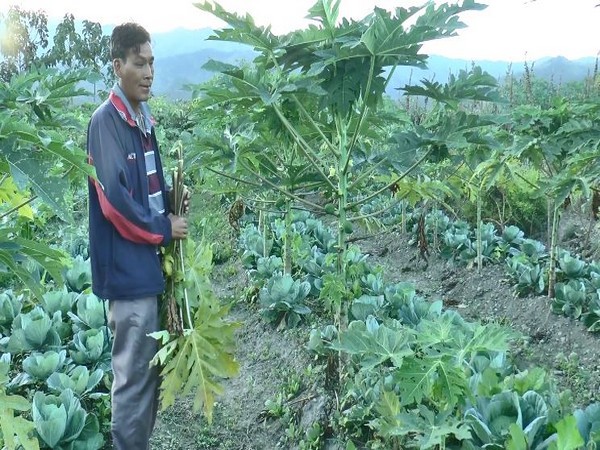IMPHAL: Many farmers from Manipur who adopted integrated farming say the new method has yielded better quality produce with higher output.
The farmers claim following the ‘Greener Revolution’ of Integrated Farming Systems (IFS) has given them fruitful outcome.
Moirangthem Ajit, a 42-year-old farmer along with wife Sundari has been cultivating papayas for the past four years in Nambol Phoijing in remote Makha Village of Bishnupur district of the state has now included several other vegetables to his field using the new farming technique.
The couple’s one hectare farm situated at the base of Keithelmanbi hill, which they started with an investment of Rs. 12,000 now has over 500 papaya plants.
“Before planting papayas, I wanted to plant other vegetables as well. I began this farm thinking that it would be more benefcial than paddy,” said Ajit, who dropped out of school in the fourth class.
Today, with the help of the integrated farming method, the farmer has other crops in his field such as, cabbage, mustard leaves, brinjal, and gourd and other vegetables, which he says have yielded him more income.
His wife Sundari said: “We faced a tough time to run the family with the meagre earnings of my father. I began earning by working in the field and took up other available jobs to support my family.”
Ahongbam Thoiba Singh, another farmer from Arapati Mamang Leikai village in Manipur had started farming at his family’s one acre of land in 2018. He later took on lease 1.5 acres of barren land after a rise in demand of vegetables and grew tomato, cabbage, cauliflower, brinjal and other vegetables on it using the integral method of farming.
Thoiba Singh claims that he is able to generate an average income of Rs 2 to Rs 3 lakh per annum using the new farming technique.
“I first planted luffa gourd (a vine plant) and after that I planted cucumber. But it was for a short span and later I planted cabbage. This season… I have earned around Rs 1.5lakh but the exact amount will be known only after I sell,” says Thoiba.
Thoiba uses imported seeds and the latest technologies to develop the farm to get better yield and looks forward to availing various schemes provided by the government. He says he also uses natural fertilizers, cow dung, and decomposed straws in his field. (ANI)





